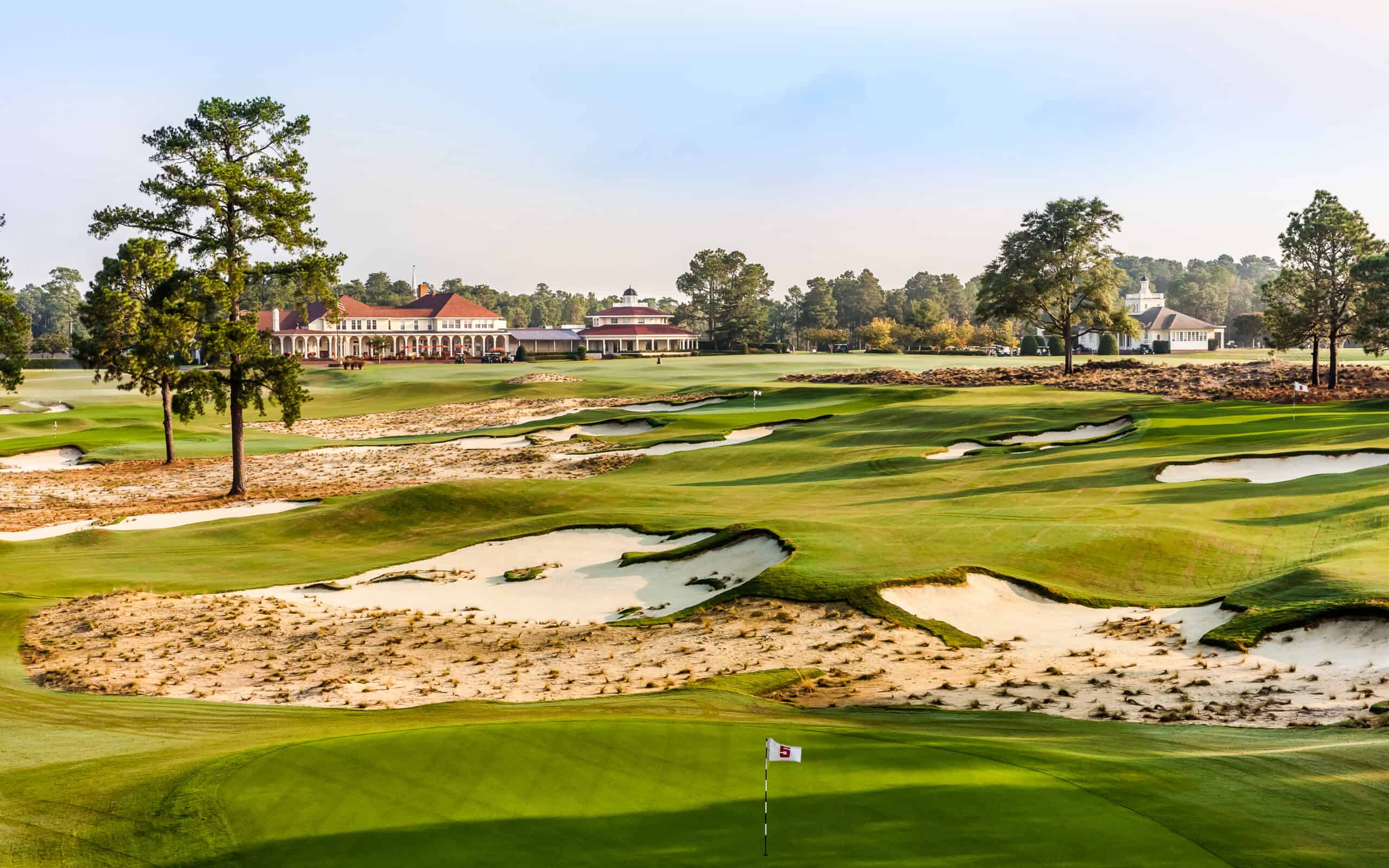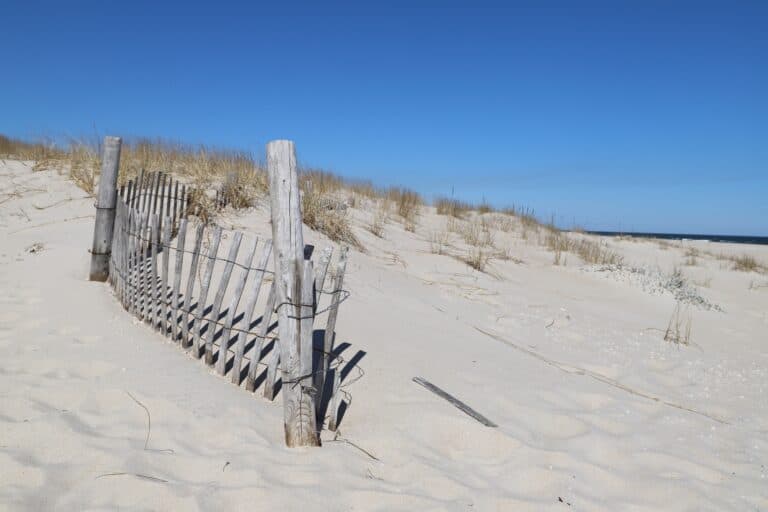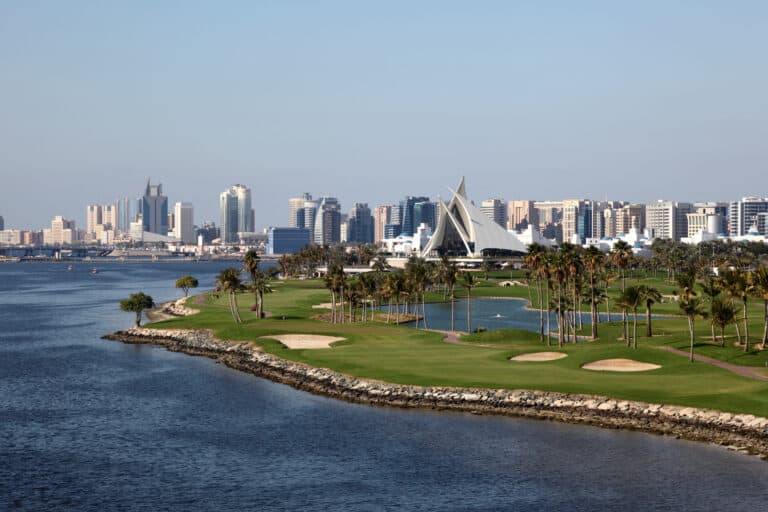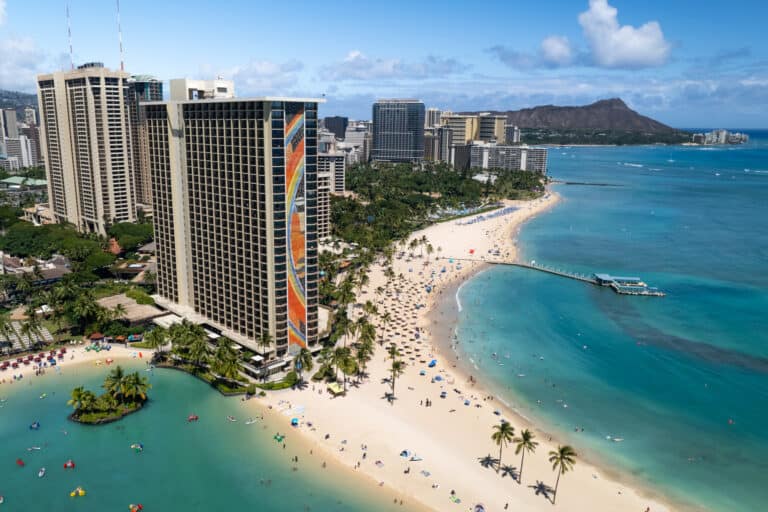The World’s 30 Most Difficult Golf Courses

Most golfers appreciate a good challenge, but when it comes to course design, there’s a fine line between difficult and sadistic. We’ve taken a look around the globe and picked out some of the golf courses that have brought even the best players in the world to their knees.
The locations featured here have been given diabolical ratings by the USGA, who keep a close eye on the difficulty of courses in America and beyond. We’ve ranked these courses in terms of their difficulty, using the USGA’s ratings from the farthest tees offered to non-professionals as a baseline. You’ll want to invest in some lessons before dragging your golf clubs to these spots.
30. Course No. 2 At Pinehurst Resort — Pinehurst, North Carolina

North Carolina’s Pinehurst Resort is a well-known sanctuary for golfers, with nine different 18-hole courses awaiting anyone who visits. While six of them have a USGA rating of at least 74, it’s No. 2 that is legendary for its challenges.
This nearly 7,600-yard monster boasts a rating of 76.5 from the U.S. Open tees, which means scratch golfers can expect to shoot at least four strokes over the par of 72. From the farthest tees used by regular players, its rating of 73.7 is a bit more manageable.
No. 2’s considerable length, severely sloped greens and an approach game that’s as demanding as any in the sport all contribute to it being ranked among the 20 toughest courses in the United States by Golf Digest.
29. East Lake Golf Club — Atlanta

The Tour Championship, presented as the PGA Tour’s ultimate challenge as it ends their playoff season, is hosted annually at East Lake Golf Club because of its considerable difficulty. From the championship tees, East Lake has a USGA rating of 76.2, which makes the prize of winning the unique “Calamity Jane” putter trophy one that is truly earned, while normal players can expect a rating of 74.
The titular body of water comes into play often, including on hole No. 8, which starts with a forced carry tee shot and then forces the player to court the lake along the entire left side of a tight fairway.
28. Harbour Town Golf Links — Hilton Head Island, South Carolina

Hilton Head is an oasis for golf lovers and Harbour Town Golf Links offers the stiffest challenge on the island. Boasting a USGA rating of 75.6 (against a par of 71) and a devastating slope rating of 148 from the PGA Tour’s Heritage tees, this is one of several courses on our list designed by the notorious Pete Dye. The course does not favor long drives off the tee because of its tight fairways, which are lined with trees. Bleacher Report called it one of the 10 toughest courses used by the PGA Tour and the world’s top players likely wouldn’t argue with that.
27. Champion Course At PGA National Golf Club — Palm Beach Gardens, Florida

You’d have to expect a real challenge from the top course at PGA National Golf Club — and you’ll be in for one if you ever play the Champion Course. The course’s already-stiff difficulty grew in 2002, when Jack Nicklaus began his first of several redesigns of its layout. As you’ll see from several courses on this list, Nicklaus can be something of a sadist when he’s plotting links and the Champion Course’s “Bear Trap” — which is the water hazard-filled stretch of holes from Nos. 15-17 — has caused even the world’s best players to lose plenty of strokes.
26. Spyglass Hill Golf Course — Pebble Beach, California

While nearby Pebble Beach Golf Links is the more famous of the pair, Spyglass Hill Golf Course is arguably the toughest of these two West Coast classics. Spyglass Hill is loaded with character, thanks to its incredible scenery and holes that are nicknamed after bits from “Treasure Island,” but its difficulty dampens the charm a bit. At hole No. 4, nicknamed “Blind Pew,” anything less than a perfect tee shot is punished with a blind approach to the green on the second stroke. It’s no wonder Golf Digest ranked it among America’s 20 toughest venues.
25. Championship Links At Royal County Down Golf Club — Newcastle, Northern Ireland

As the birthplace of golf, the United Kingdom has some of the most iconic courses in the world, but not all of them are considered as challenging as modern venues. Northern Ireland’s Royal County Down is home to one of the most diabolical courses in the world, however, on its Championship Links.
The USGA has given the par-71 course a rating of 74.8 and a slope rating of 142 from the blue tees, which is just shy of the maximum difficulty grade of 155.
When golf writers from Mississippi Today played a round on the Championship Links, they cited the howling wind, rain and deep bunkers as reasons why no one has allegedly ever broken 70 from the back tees used by regular players.
24. The Stadium Course At PGA West — La Quinta, California

The aforementioned Pete Dye didn’t earn his nickname, “The Marquis de Sod,” for nothing. Another of his notorious courses, this one part of the six PGA West venues in La Quinta, has a USGA slope rating of 148 from the black tees (remember, the maximum grade is 155).
It’s a Scottish links-style affair loaded with moguls and deep bunkers, which landed the Stadium Course among Golf Pass’s 10 most difficult public courses in the United States. While you’re visiting PGA West, hit up the even longer Nicklaus Tournament Course for another bear of a challenge, provided you still enjoy the game after your round on the Dye links.
23. Pound Ridge Golf Club — Pound Ridge, New York

Situated about an hour from Manhattan, Pound Ridge Golf Club offers New York swingers one of the best challenges they’ll find that close to the city. With a vicious USGA slope rating of 148 and overall grade of 75.9 from the black tees, it’s no wonder Pound Ridge was listed among the toughest public courses in the United States by Golf Pass.
This one is all about accuracy and trust in your own game, as the fairways and approach windows are often ultra-tight, as you can see from this frightening shot of the 15th green. Would it shock you to know Pete Dye designed this one, too?
22. Ile Aux Cerfs Golf Club — Trou d’Eau Douce, Mauritius

Formerly known as Le Touessrok, this course designed by legendary PGA Tour golfer Bernhard Langer offers the toughest golf you’ll find off the east coast of Africa. Located on a separate island off the island nation of Mauritius, to even play Ile Aux Cerfs you’ll need to reach the course by either a helicopter or boat, the latter of which leaves every 30 minutes.
CNN called it one of the world’s 10 toughest golf venues, blaming long carries over swamps, water hazards, tiny greens and massive bunkers as the chief reasons. But the selfies you’ll take while losing your golf balls will be very tough to beat!
21. Stadium Course At TPC At Sawgrass — Ponte Vedra Beach, Florida

Arguably Pete Dye’s most famous course, TPC Sawgrass’s Stadium Course is known for making even the world’s best players sweat over their club selection. The final two holes in particular will destroy a respectable score in a hurry, with the notorious 17th hole providing the most intimidating forced carry on the PGA Tour.
In 2018, some of the best amateur players in the world averaged a score of 98.74 at the Stadium Course, according to Golf Pass. When the course is played from the TPC tees, it has a USGA slope rating of 155, the absolute maximum, while non-professionals can play it at a 149 slope rating, which isn’t much more forgiving.
20. Lake Course At The Olympic Club — San Francisco

With more than 7,000 yards from the back tees, your legs will be as tired as your mind after you’re done wrestling with The Olympic Club’s Lake Course. Like all venues on the U.S. Open rotation, the challenges here are immense, and they reward planning over power. The par-71 course has a USGA rating of 75.1 from the black tees and can get even tougher if the marine layer settles in, making you cross your fingers after each shot.
Tiny, elevated greens and difficult sight lines make this a true test even for the world’s most gifted players. The players at the 1955 U.S. Open found that out the hard way, when they collectively averaged nearly nine strokes over par for the tournament.
19. The Bear At Grand Traverse Resort — Williamsburg, Michigan

Michigan’s Grand Traverse Resort is home to a trio of beautiful golf courses, but The Bear may just eat your confidence alive. The black tees give the course a USGA slope rating of 150, which has to make designer Jack Nicklaus grin like the Grinch. Users at Golf Pass rated it as one of the five most difficult public courses in the United States in 2020, thanks to mogul-filled roughs that will shred your score. Grand Traverse’s Wolverine course also offers a great challenge if you’re still feeling brave.
18. Old American Golf Club — The Colony, Texas

Every course we’re featuring on this list has a USGA bogey rating of at least 100 from the back tees, meaning average golfers likely won’t score below that massive number even on their best days. Old American Golf Club, located just north of Dallas, has a bogey rating of 102.1, partly because the course is stacked with hazards on virtually every hole and high winds frequently wreck a player’s accuracy. In 2020, Golf Pass ranked Old American as the second toughest public golf course in the United States, after a survey of thousands of its users.
17. Shinnecock Hills Golf Club — Southampton, New York

No list of great — or difficult — golf courses would be complete without historic Shinnecock Hills. This legendary New York venue has been punishing players since the late 19th century and has been called one of the 20 toughest courses in the United States by Golf Digest in the past decade. When playing from the red tees, which are the longest on offer, great golfers can expect to shoot about a 74 on this par-70, links-style course, per the USGA’s rating system. Despite the immense challenge presented by its tight greens and often windy conditions, one writer at Golf Channel called Shinnecock Hills “the best golf course in America.”
16. The West Course At Winged Foot Golf Club — Mamaroneck, New York

A mainstay of the brutal rotation of U.S. Open courses, Winged Foot’s West Course is one of the more well-known venues on our list. This USGA 76.4-rated course features tight fairways, dense roughs and greens that may prompt you to schedule an eye exam after you inevitably misread them. It shouldn’t surprise you that the West Course was rated as the toughest course on the entire PGA Tour schedule for the 2020-21 season.
15. Oaks Course At TPC San Antonio — San Antonio

A pair of challenging courses awaits players at TPC San Antonio, with the 7,400-yard Oaks Course — co-designed by golf icons Greg Norman and Sergio Garcia — being the more sinister sibling. This venue has only been open since 2010, but it’s already earned a reputation for being one of the biggest challenges on the PGA Tour circuit.
“It was viewed as an unfair golf course, almost too tough,” Larson Segerdahl, director of the Oaks Course-hosted Valero Open, told the San Antonio Express News, revealing comments made to him by professionals in the early years of the event.
Changes were made to soften the punishment in 2012, especially on the greens, but the course still has a USGA rating of 76.6 from the black tees.
14. Butler National Golf Club — Oak Brook, Illinois

At the 1975 Western Open, Lee Trevino got struck by lightning while playing Butler National and that seems to be an apt metaphor for the venue’s dangers.
This super-tough course situated in the Chicago suburbs has been easily ranked among the 20 toughest courses in the United States by Golf Digest. It demands precision off the tee and on the approach, as the roughs are known to be long and exacting.
From the farthest tees, Butler National holds a maximum USGA slope rating of 155 and a blistering bogey rating of 107.9 against a par of 71, which means that average golfers can expect to miss par by nearly 40 strokes!
13. Copperhead Course At Innisbrook Resort — Palm Harbor, Florida

While courses with intimidating names can sometimes underwhelm, Innisbrook Resort’s Copperhead more than lives up to its venomous title. More than 7,200 yards of distance await players from the black tees, which hold a USGA rating of 75.9 for a par-71 expectation. After 15 challenging holes of golf, Copperhead plays mind games with its players by displaying a large bronze statue of a striking snake ahead of the final three.
That stretch of holes is known as the “Snake Pit” and requires pinpoint accuracy and perfect club selection to avoid the many hazards and winds that can gust up to 30 miles per hour.
12. Oakmont Country Club — Plum, Pennsylvania

Precision putting is the name of the game at Oakmont Country Club, where getting on the dance floor is where the fun really starts. This Pennsylvania landmark, which has been testing golfers since the early 1900s, is a par-70 layout with a USGA rating of 75.3 and a bogey rating of 101.1 from the non-professional tees, meaning average golfers have virtually no chance at a respectable score. While the fairways aren’t particularly tight, the rough comes into play often because of slopes, and the approach shots require a local caddie’s knowledge to hope for anything close.
In a writeup for Links Magazine, scratch-golfer Graylyn Loomis called it a “diabolical test” and reported that he shot a 91.
11. Championship Course At Carnoustie Golf Links — Carnoustie, Scotland

For nearly 100 years, golfers of all skill levels have been shouting obscenities on the links at Carnoustie’s historic Championship Course. From the farthest tees not used by the pros, the USGA gives the course a 75.2 rating and a bogey rating of 101.1 on a par of 72. The deep pot bunkers at the Championship Course are the stuff of legend, while high winds, ultra-firm fairways and walls that elevate some of the greens areas are just icing. CNN calls it the second-toughest golf course in the entire world and PGA Tour professionals have called “Carnasty” the most difficult test they see in Europe.
10. Quail Hollow Club — Charlotte, North Carolina

The course at Quail Hollow Club is a mainstay on the PGA Tour, including as a venue for the PGA Championship. The par-72 course holds a USGA rating of 77.2 from the farthest tees and a bogey rating of 104.6, which would be considered a solid score from those tees by an average player.
The whole round at Quail Hollow is challenging, but the nightmare really begins at hole No. 16, where the three-hole closing stretch is dubbed “The Green Mile.” All three holes beg players to lose a ball in the water, as the greens are surrounded by a lake and a creek.
9. The Ocean Course At Kiawah Island Golf Resort — Kiawah Island, South Carolina

Like so many of the courses on this list, stunning views belie how nasty the challenge is at Kiawah Island’s Ocean Course, which was co-designed by Pete Dye and his wife, Alice Dye. This PGA Tour mainstay is legendary for its punishing difficulty, with both Golf Digest and CNN ranking it as the toughest golf course around.
From the championship tees, which are mercifully only used by the pros, the Ocean Course’s USGA rating is a ridiculous 79.1 and holds a bogey rating of 108.1, which is the highest of any course we researched.
For non-tournament players, the Ocean Course is a bit more manageable, with a USGA rating of 73.9 and slope rating of 148, but is still no beachside picnic.
8. The Straits Course At Whistling Straits — Mosel, Wisconsin

The natural beauty you’ll see while playing at Wisconsin’s Scottish links-inspired Straits Course is in sharp contrast to the terror you’ll feel while marking down your scores. This course punishes any and all mistakes and will give your sand wedge a serious workout, provided you don’t lose your ball off a cliff.
It’s got a USGA course rating of 77.2 from the black tees and both CNN and Golf Pass have it ranked among the 10 toughest courses around.
If you’re up for an “easier” challenge, the Whistling Straits Irish Course has a rating of 75.6, meaning it could qualify for this list as well.
7. Augusta National Golf Club — Augusta, Georgia

Getting the chance to even play at Augusta National is nearly impossible for a non-member of the elite club, but if you do, you’ll be in for a vicious challenge. While the course isn’t officially graded by the USGA, an unofficial assessment of the difficulty puts it at a rating of 78.1 from the back tees, according to Golf Digest.
The course, which is arguably America’s most beloved golf venue, boasts more than 7,400 yards of distance, plenty of water hazards, tough pin positions and greens that are known to frustrate even the best putters.
6. The Old White Course At The Greenbrier — White Sulphur Springs, West Virginia

While PGA Tour professionals like Stuart Appleby and Kevin Chappell have shot sub-60 rounds at Old White, you will likely have no such luck at this Appalachian beauty. It’s nearly 7,300 yards long from the black tees and boasts a USGA rating of 76, putting it in rarefied air in terms of difficulty. Undulating greens, tight fairways and that marathon length contribute to the challenging reputation of this century-old course.
5. The Pete Dye Course At French Lick Resort — French Lick, Indiana

Arguably Pete Dye’s final masterpiece, the course named for him at Indiana’s French Lick Resort is a sprawling brute that promises to exhaust any player both mentally and physically. Players will find more than 8,100 yards of distance from the back tees, and when you pair length like that with Dye’s signature sadism you’ve got a recipe for high scores.
The USGA rated the course at 80, which makes it the only course on our list to hit that mark. Golf Pass users have regularly ranked it among the toughest courses in the United States, citing greens that are “almost impossible” as a chief reason.
4. The Dubsdread Course At Cog Hill Golf & Country Club — Lemont, Illinois

Located just outside of Chicago, Cog Hill is home to four golf courses and the Dubsdread (aka No. 4) is the crown jewel. With more than 7,500 yards of total distance from the black tees, the course is one of few to surpass a USGA rating of 78, making the par of 72 seem like a pipe dream.
In a detailed course review at Breaking Eighty, writer Sean Ogle reported on deep bunkers, tricky sight lines and unforgiving roughs, adding up to a score of 97.
“Dubsdread is essentially the golf equivalent of someone who is into S&M,” Ogle wrote. “The entire round is a combination of pleasure and pain.”
3. The South Course At Torrey Pines Golf Course — San Diego

While all the courses on the U.S. Open rotation are challenging, the South Course at Torrey Pines is among the most demanding. The length alone, which spans more than 7,800 yards from the black tees, makes it a test of physical endurance unlike many other courses used by the PGA Tour.
The par-72 venue boasts a USGA rating of 78.8 and challenges players to stop their approach shots on greens that sit right against the edge of cliffs over the Pacific Ocean. Tight fairways and deep bunkers that seem unavoidable await anyone that plays at Torrey Pines South.
2. Pine Valley Golf Club — Pine Valley, New Jersey

The USGA slope rating for New Jersey’s Pine Valley Golf Club hits the maximum of 155 from the back tees, but even if you’re playing from the senior tees, it’s got a grade of 150! This par-70 venue demands pinpoint accuracy from the tees and with the irons, as trees and massive sand traps await any off-target shots, quickly ruining a player’s score. Golf Digest named it the second-toughest course in the United States in a 2011 roundup, which we agree with.
1. The Black Course At Bethpage State Park — Farmingdale, New York

Long Island’s Bethpage State Park is home to five 18-hole courses, with some genuine challenges among them. The Bethpage Red Course has a brutal USGA rating of 74.4 from the back tees, but the Black Course’s rating of 77.5 beckons confident players from all over. Bethpage Black plays mind games with its challengers before the first tee shot is taken, thanks to an infamous sign that reads, “Warning: The Black Course is an extremely difficult course which we recommend only for highly skilled golfers.”
The shortest par four here plays like 400 yards thanks to an uphill carry, which is just one reason why Golf Pass has called it the toughest public course in the United States. We’ll do them one better than that and say it’s golf’s ultimate test.
This article originally appeared on SimpleMost.com and was syndicated by MediaFeed.org.






